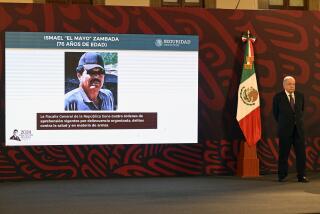Ex-Spy Chief Back in Peru as Prisoner
- Share via
LIMA, Peru — A Peruvian police plane returned former intelligence chief Vladimiro Montesinos to his native land as a prisoner Monday, ending an eight-month, U.S.-aided manhunt and opening a new, uncertain chapter in this country’s history.
Wearing bluejeans and a beige shirt, Montesinos was immediately escorted to Peru’s central jail, where he faced questioning on charges ranging from money laundering to drug trafficking to human rights violations.
Peruvian officials said Montesinos’ upcoming trials will be a first step to heal a country shaken by revelations that the spymaster used bribes and threats to control a seemingly endless array of officials in the country’s courts, Congress, military and media.
“Montesinos is going to be parading through courtrooms, one after another,” said Jose Carlos Ugaz, the Peruvian special prosecutor who is leading the investigation of the former spy chief. “It’s going to be like a road show. Not the trial of the century, the trials of the century.”
As it has in many other events in his life, the U.S. played a crucial role in Montesinos’ arrest, which continued Monday to be surrounded by mystery and controversy.
Chief among the questions was the role played by Venezuela, where Montesinos apparently had been hiding out since shortly after he fled Peru in October by private yacht.
Peruvian officials have long suspected the government of Venezuelan President Hugo Chavez of protecting Montesinos. At least one explanation was that Montesinos and former Peruvian President Alberto Fujimori had offered Chavez’s military allies shelter in Peru after a failed coup attempt by Chavez in 1992.
In fact, Peruvian officials were so suspicious of Chavez that, after learning from U.S. officials last week that Montesinos was in Venezuela, they hatched a plan to short-circuit local authorities by delivering Montesinos directly to the Peruvian Embassy in Caracas, the Venezuelan capital, sources close to the investigation told The Times.
That plan never came to fruition because Venezuelan military intelligence agents themselves arrested Montesinos, who was alone and unarmed, Saturday night in a slum within sight of the presidential palace. Montesinos’ own bodyguards, former Venezuelan intelligence and police agents, betrayed him, according to a U.S. Embassy official.
Latin America’s most wanted man seemed well aware of the symbolic importance of his capture. On Sunday night, when Venezuelan authorities in Caracas turned him over to Peruvian Interior Minister Antonio Ketin Vidal, the spy chief’s longtime rival, Montesinos pronounced a phrase that had special meaning for both men: “It was my turn to lose.”
Those were the same words Peruvian terrorist warlord Abimael Guzman said to Ketin nine years earlier, when he was arrested after a dramatic hunt in Peru, then on the brink of anarchy. Montesinos’ arrest sparked a euphoria in Peru similar to the one produced by Guzman’s capture.
“The capture of Montesinos was the culmination of months of cooperation,” said the U.S. Embassy official.
Venezuelan officials have long denied sheltering Montesinos, though in April, a plastic surgeon came forward to say he had operated on Montesinos at a clinic in Caracas. Despite the claim, Montesinos’ appearance Monday did not seem strikingly different from what it was prior to his flight.
On Monday, top Venezuelan government officials continued to be extremely tight-lipped about the circumstances surrounding his arrest.
Opposition leaders and pundits demanded an explanation of the capture and interpreted the government’s silence as proof that it was trying to duck the issue.
“How is it possible that Montesinos was here for eight months and the Venezuelan government didn’t know about it?” said Julio Borges, a congressman in the Venezuelan assembly’s tiny opposition party. “There are two explanations. Either the government knew and was complicit, or it is incapable.”
If Montesinos cooperates in any investigation, that could have profound consequences for top officials and agencies in countries ranging from the United States to Venezuela to Peru.
Montesinos, a longtime CIA ally, is suspected of aiding leftist Colombian rebels with arms purchases only a few years after he mounted a campaign against leftists in his own country.
He could also implicate Fujimori, now in self-imposed exile in Japan. The former president, who fled in disgrace in November after Montesinos’ downfall, faces many inquiries, but investigators have not yet come up with convincing evidence. Montesinos could reduce a possible life sentence if he cooperated, Peruvian officials say.
All told, Montesinos faces more than 50 trials based on 140 investigations involving crimes ranging from thievery to death squad activity to drug trafficking to gunrunning.
Montesinos’ 257-day flight across Latin America began to go awry in the last few months thanks to the help of the FBI and a determined task force led by Ketin, according to sources close to the investigation.
Ketin, a shy, bespectacled man, was in charge of the Odessa group, a team of about 80 Peruvian National Police officers. To catch Montesinos, Ketin used the same patient and cerebral tactics that made him a legend in the early 1990s, when he tracked down terrorists such as Guzman.
The Odessa group worked closely with a team of FBI agents coordinated by a special agent based in Lima, the Peruvian capital, and using agents from the Miami field office, which handles many Latin American cases.
The FBI opened two investigations against Montesinos: one into terrorism-related activity for allegedly selling AK-47s to Colombian guerrillas and a second into money laundering.
Over recent months, the money-laundering investigation led to the arrests in Miami of Victor Alberto Venero, allegedly a key front man for millions of dollars that Montesinos pilfered from government coffers, and former Col. Manuel Aivar, considered one of the spy chief’s key operational aides.
Federal agents also obtained an order to freeze $58 million in assets controlled by Montesinos and held at Pacific Industrial Bank, reportedly a Cayman Islands-based institution with offices in Miami.
Then, two months ago, a Peruvian judge working on the Montesinos case asked the FBI in Miami to investigate a newly discovered Montesinos account, in which agents discovered $38 million.
The break in the case came a month ago, when Montesinos sent an aide to Miami from Venezuela to withdraw the $38 million. When the bank refused, the aide became angry and began threatening top bank officials, the U.S. Embassy official said.
Ugaz said the aide, whose last name is Perdomo, was one of a group of retired Venezuelan intelligence officials whom Montesinos hired to guard him while on the run.
Bank officials called in the FBI, which had an agent pose as a bank employee and communicate with Perdomo via e-mail. Perdomo sent several e-mails threatening to expose the bank for money laundering unless the money was released, the U.S. Embassy official said.
When Perdomo arrived at the bank Thursday to meet with the undercover agent he believed to be a bank representative, FBI agents arrested him and two bodyguards, according to Peruvian officials.
Perdomo then told the investigators he had been guarding Montesinos in Caracas and knew the general location of his hide-out, according to U.S. and Peruvian officials.
Montesinos, he said, had been moving from safe house to safe house in the Caracas area. The spymaster was also receiving protection from former Venezuelan intelligence and police officials, Perdomo told investigators, according to the U.S. Embassy official.
Perdomo agreed to reveal Montesinos’ whereabouts in exchange for immunity from prosecution on blackmail charges in Miami, Ugaz said.
When Montesinos’ bodyguards in Caracas learned of Perdomo’s arrest, they tried to arrange a deal to turn Montesinos over to the Peruvian authorities. Instead, they turned Montesinos over to the Venezuelan military intelligence, according to sources close to the investigation.
It was unclear Monday why Montesinos’ bodyguards changed course at the last minute, though pressure was clearly building on the Chavez government.
“This was forced on the Chavez government,” said a U.S. source familiar with the case, questioning Chavez’s triumphant declarations about the arrest by his military intelligence service.
When the end came, it was a whisper. Like many Latin American strongmen, the seemingly untouchable Montesinos was captured without a struggle, a demonstration of how quickly power can evaporate.
When Venezuelan military intelligence agents kicked in the door of his apartment, Montesinos was alone, without family or friends, in a slum of Soviet-style apartment blocks built by a former dictator.
The man who once controlled a private army and doled out bricks of cash had only $8,000. He didn’t fight back. His bodyguards had deserted him.
He simply raised his hands and surrendered.
*
Times staff writers Miller and Rotella reported from Caracas and Riverside, respectively. Special correspondent Tarnawiecki reported from Lima.
More to Read
Sign up for Essential California
The most important California stories and recommendations in your inbox every morning.
You may occasionally receive promotional content from the Los Angeles Times.













